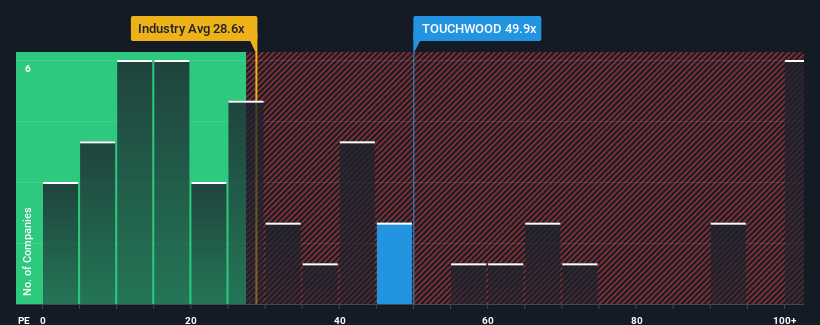- India
- /
- Consumer Services
- /
- NSEI:TOUCHWOOD
Touchwood Entertainment Limited's (NSE:TOUCHWOOD) Earnings Haven't Escaped The Attention Of Investors

When close to half the companies in India have price-to-earnings ratios (or "P/E's") below 33x, you may consider Touchwood Entertainment Limited (NSE:TOUCHWOOD) as a stock to avoid entirely with its 49.9x P/E ratio. Although, it's not wise to just take the P/E at face value as there may be an explanation why it's so lofty.
The earnings growth achieved at Touchwood Entertainment over the last year would be more than acceptable for most companies. It might be that many expect the respectable earnings performance to beat most other companies over the coming period, which has increased investors’ willingness to pay up for the stock. If not, then existing shareholders may be a little nervous about the viability of the share price.
View our latest analysis for Touchwood Entertainment

Does Growth Match The High P/E?
Touchwood Entertainment's P/E ratio would be typical for a company that's expected to deliver very strong growth, and importantly, perform much better than the market.
If we review the last year of earnings growth, the company posted a terrific increase of 23%. Pleasingly, EPS has also lifted 232% in aggregate from three years ago, thanks to the last 12 months of growth. Accordingly, shareholders would have probably welcomed those medium-term rates of earnings growth.
Weighing that recent medium-term earnings trajectory against the broader market's one-year forecast for expansion of 25% shows it's noticeably more attractive on an annualised basis.
With this information, we can see why Touchwood Entertainment is trading at such a high P/E compared to the market. It seems most investors are expecting this strong growth to continue and are willing to pay more for the stock.
What We Can Learn From Touchwood Entertainment's P/E?
Generally, our preference is to limit the use of the price-to-earnings ratio to establishing what the market thinks about the overall health of a company.
We've established that Touchwood Entertainment maintains its high P/E on the strength of its recent three-year growth being higher than the wider market forecast, as expected. At this stage investors feel the potential for a deterioration in earnings isn't great enough to justify a lower P/E ratio. If recent medium-term earnings trends continue, it's hard to see the share price falling strongly in the near future under these circumstances.
You need to take note of risks, for example - Touchwood Entertainment has 3 warning signs (and 1 which makes us a bit uncomfortable) we think you should know about.
You might be able to find a better investment than Touchwood Entertainment. If you want a selection of possible candidates, check out this free list of interesting companies that trade on a low P/E (but have proven they can grow earnings).
If you're looking to trade Touchwood Entertainment, open an account with the lowest-cost platform trusted by professionals, Interactive Brokers.
With clients in over 200 countries and territories, and access to 160 markets, IBKR lets you trade stocks, options, futures, forex, bonds and funds from a single integrated account.
Enjoy no hidden fees, no account minimums, and FX conversion rates as low as 0.03%, far better than what most brokers offer.
Sponsored ContentValuation is complex, but we're here to simplify it.
Discover if Touchwood Entertainment might be undervalued or overvalued with our detailed analysis, featuring fair value estimates, potential risks, dividends, insider trades, and its financial condition.
Access Free AnalysisHave feedback on this article? Concerned about the content? Get in touch with us directly. Alternatively, email editorial-team (at) simplywallst.com.
This article by Simply Wall St is general in nature. We provide commentary based on historical data and analyst forecasts only using an unbiased methodology and our articles are not intended to be financial advice. It does not constitute a recommendation to buy or sell any stock, and does not take account of your objectives, or your financial situation. We aim to bring you long-term focused analysis driven by fundamental data. Note that our analysis may not factor in the latest price-sensitive company announcements or qualitative material. Simply Wall St has no position in any stocks mentioned.
Have feedback on this article? Concerned about the content? Get in touch with us directly. Alternatively, email editorial-team@simplywallst.com
About NSEI:TOUCHWOOD
Touchwood Entertainment
Engages in the provision of wedding and event management services in India.
Solid track record with excellent balance sheet.


